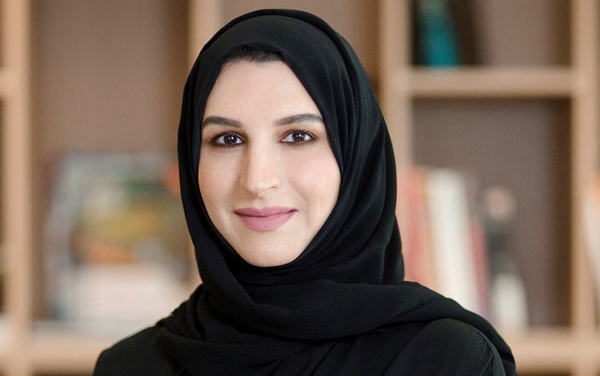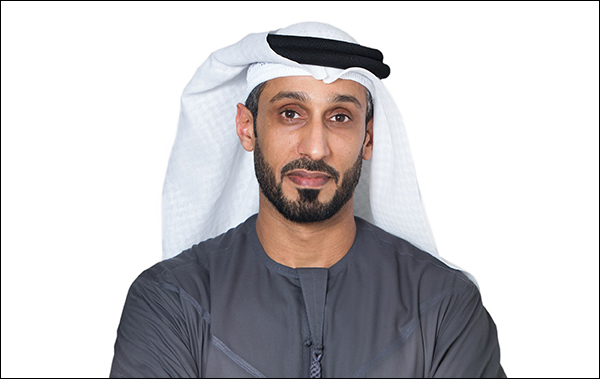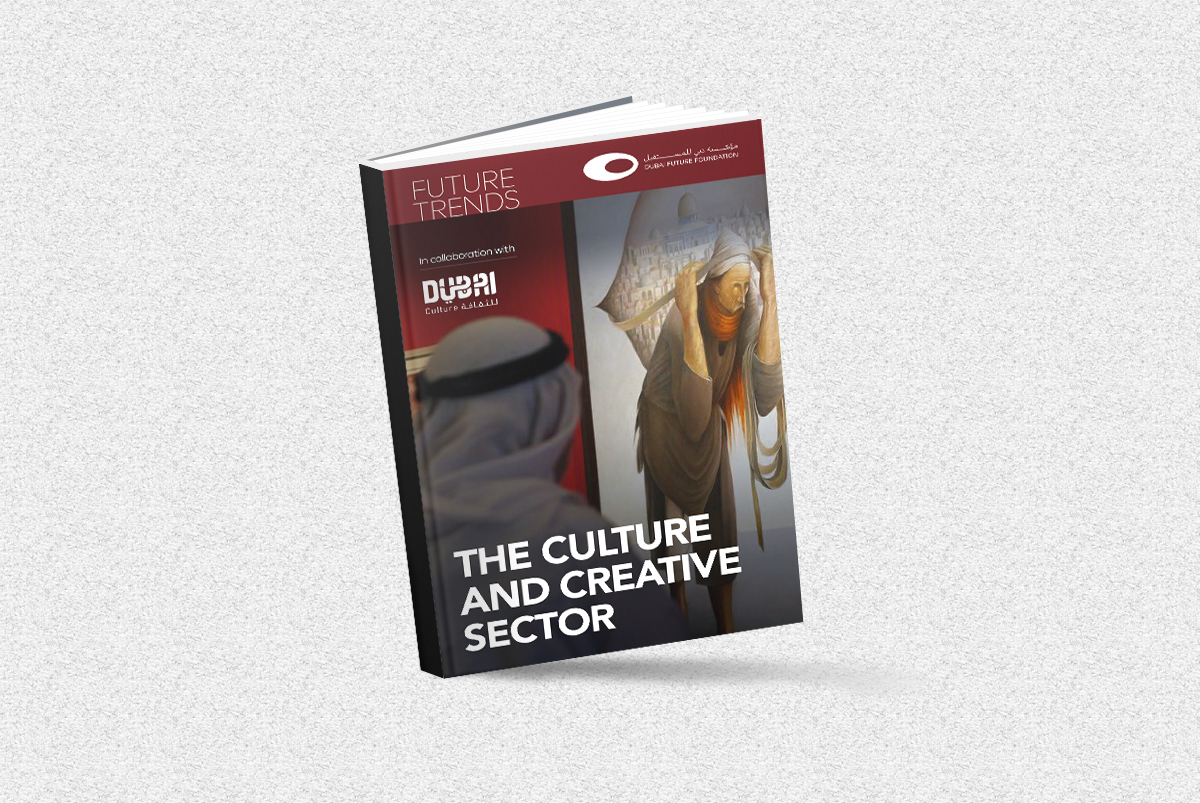Highlighting the significance of initiatives around the world in supporting the creative sector and enhancing its resilience to adapt to life in post-COVID-19 times, Dubai Future Foundation (DFF), in partnership with Dubai Culture and Arts Authority, today launched its latest report titled ‘Future Trends: Culture and The Creative Sector. The report focuses on the restrictions that the coronavirus pandemic has imposed on movements and social and cultural activities.
The report emphasized that the growth of the cultural and artistic sectors during the upcoming period will greatly depend on their flexibility in employing modern technologies in an innovative manner to ensure a quantitative leap in their levels of engagements. It pointed out that artists, galleries and institutions in the region and globally have all adapted to working and engaging with their audiences and stakeholders across digital platforms. Many artists working with audiovisual content have enabled free access of their works online to audiences far and wide.

Hala Badri, Director General of Dubai Culture and Arts Authority, said: “The COVID-19 crisis imposed challenges on the cultural and creative sector, considered one of the vital economic sectors in many countries and constituting an important component of the national economy, and on the business and economic sectors in general. In light of these exceptional circumstances, it is imperative that all those in charge of the sector in Dubai and the UAE intensify efforts and take measures to develop mechanisms and solutions to support the creative community and enable it to ensure its continuity and prosperity in the future, especially for small companies and independent entrepreneurs working in this sector.”
Badri added: “The Authority, in collaboration with its partners from the cultural sector, is working for the post-COVID-19 period by conducting continuous studies to meet the challenges facing the creative community and develop its infrastructure to explore ways of cooperation to move towards broader horizons of growth. These studies also aim to create innovative solutions that contribute to financing and supporting the continuity of innovators, emerging companies, and cultural and creative entrepreneurs, while also attracting new talents. Our cooperation with the Dubai Future Foundation in issuing this report is part of this effort.”
She also indicated that the cultural and creative sector in the United Arab Emirates was flexible in adapting to new circumstances by taking advantage of developments in the telecommunications sector and digital services in harnessing the digital space to maintain the momentum of the cultural scene in light of this crisis. She added: “With the abundant availability of cultural and creative content on digital platforms, it is imperative to develop policies and legislation that would protect the rights of artists and creators while also ensure the highest standards of intellectual property, which constitutes an essential axis of our updated strategy that is aimed at strengthening Dubai’s position as a global centre for art and culture, an incubator for creativity, and a thriving hub for talent. Our efforts in that regard are progressing, and we are working to build a comprehensive and sustainable system to develop creativity in Dubai.”

For his part, Khalfan Belhoul, CEO of Dubai Future Foundation, said: “Technological tools and innovations offer new opportunities for the cultural and creative sector to foray into new markets and reach a wider global audience, through adopting a fresh approach in shaping artistic and cultural experiences. In turn, this also allows individuals interested in exploring cultural experiences in a digital realm and those unable to travel due to COVID-19 restrictions the option of trying out such experiences easily. Furthermore, these developments also contribute to building new economic sectors and job opportunities in the fields of technology and creativity.
He highlighted that the UAE has established a global model in employing modern technology in vital sectors that keep pace with the rapid changes taking place in the world.He pointed out that the recent global developments as a result of the pandemic have radically transformed the world’s perception of the role of future technology and underlined the urgent need to accelerate tech-focused applications across all domains.
For a sector that is driven by social gatherings, shared proximity with performers, and a physical appreciation of creative artefacts and cultural spaces, the social distancing measures activated in March – resulting in museum and gallery closures, the indefinite cancellation of cultural events and an abrupt halt in international travel – provided new challenges. However, the sector demonstrated its resilience in adapting to the crisis in ways that were both innovative and positive. For example, many museums and galleries skillfully pivoted their experiential services into online offerings, creating virtual tours for the audience to continue to enjoy.
Dubai Culture and Arts Authority launched virtual guided tours across all its museums to preserve audience interaction and interest in Dubai’s heritage and history. Through collaborating to support the home-schooling curriculum during the lockdown, the initiative drew the participation of over 11,300 students from 94 public and private schools across the UAE.
The report highlighted the series of initiatives that Dubai Culture and Arts Authority launched to further support the Creative and Cultural Industries (CCI) following several discussions. These initiatives include a partnership with LinkedIn to provide creative professionals with complimentary access to specialized e-learning courses, and the launch of a community initiative ‘Create Together’, to encourage creativity and spread happiness, inspiration and positivity.
The UAE is a major player in the region’s creative economy, and has established a reputation as an innovation hub through investing in varied creative and cultural avenues. Key examples of its efforts include the establishment of the Louvre Abu Dhabi, the Dubai Design District, the Sharjah Biennial, the annual Emirates Airline Festival of Literature, Dubai Design Week, Jameel Arts Centre, Alserkal Avenue and Art Dubai.
Similarly, with considerable forethought, the UAE has cultivated a dedicated startup ecosystem, accounting for 60 percent of total regional investment in new businesses, according to a report issued by MAGNITT titled ‘2019 MENA Venture Investment Summary’. Support for CCI enterprises in the UAE has led to the shaping of creative clusters such as Dubai Media City and the launch of the UAE Cultural Development Fund, which fosters the creation of cultural products and supports cultural activities.
Worldwide, governments are attempting to alleviate the financial disruption to the CCI sector through implementing contingency measures for the short term. Governments are advancing creative policy incentives and, in some cases, providing direct financial assistance. Much of the emergency funding and financial relief have been directed towards preserving public cultural institutions such as museums, libraries and theatres. However, the CCI sector predominantly rides on the coat-tails of SMEs, depending on freelance work that makes it inherently fragmented. Many of the small businesses and freelance professionals involved in their operations are now facing long-term income loss that will continue beyond lockdowns as many have limited access to credit or social safety nets.
The UAE’s Ministry of Culture and Youth has launched the National Creative Relief Programme providing grants up to Dh4.6 million to the UAE’s creative sectors. The United Kingdom’s Arts Council England has initiated an emergency relief fund of £160 million for art organizations and artists. Furthermore, £20 million from the fund has been allocated specifically to support freelance workers.
For its part, the Australian government launched a stimulus package of AU$250 million to support the CCI sector. The Mexican government has allocated US$1.3 million to support artists and cultural professionals. South Africa’s Department of Sports, Arts and Culture has established a relief fund of US$8.3 million for artists, athletes and technical personnel. Likewise, Sweden has committed €45 million to support individual actors and organizations in the culture sector through entities such as the Swedish Arts Council and the Arts Grant Committee.
The new report recommends that financial support from governments can take the form of rent relief, utility bill support, license-fee waivers, support grants, customs and VAT fee waivers. To ensure the retention and continuity of creative talent, governments must focus on attracting more creative professionals and facilitate the shaping of a creative community. Content and economic interests should be protected to ensure intellectual property of the highest standard.
Furthermore, the report states that demand for CCI can be created through producing initiatives that encourage the government and private sector to use the industries’ services. Governments should incentivize and encourage philanthropy and social impact investments in CCIs to garner sustainable social and financial returns.
